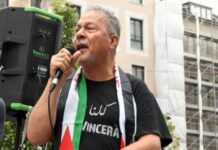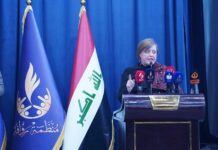The following list of pre-Oslo “Old Prisoners” includes the names of the 26 Palestinian prisoners held since prior to the implementation of the Oslo Accords who are expected to be released on Tuesday, October 29. These names were released in Hebrew by the Israeli Prison Services on Sunday, October 27. Samidoun Palestinian Prisoner Solidarity Network salutes these prisoners of freedom, whose names are listed below, followed by the year of their imprisonment and their home in Palestine. We reiterate the welcome to these prisoners – and warnings about the use of Palestinian prisoners as a “bargaining chip” in negotiations – expressed on the first such release (reprinted below).
1. Mohammed Ibrahim Mohammad Nasser – 1985 – Ramallah
2. Rafeh Farhud Mohammad Karajeh – 1985 – Ramallah
3. Mohammad Ahmad Mahmud al-Sabbagh – 1991 – Jenin
4. Hazem Qassem Taher Shubeir – 1994 – Gaza
5. Hilmi Hamad Obeid al-Amawi – 1994 – Gaza
6. Ahmad Saed Mohammad al-Damouni – 1990 – Gaza
7. Yousef Awwad Mohammad Masalhiya – 1993 – Gaza
8. Sharif Hassan Atiq Abu Dheila – 1992 – Nablus
9. Mustafa Amer Mohammad Ghneimat – 1985 – Hebron
10. Ziad Mahmoud Mohammad Ghneimat – 1985 – Hebron
11. Rizq Ali Khader Salah – 1993 – Bethlehem
12. Al-Afu Musbal Nofal Shuqeir – 1986 – Salfit
13. Muayad Salim Mahmoud Hijjeh – 1992 – Nablus
14. Najeh Mohammad Badwi Muqbel – 1990 – al-Khalil
15. Hazza Mohammad Hazza Saedi – 1985 – Jenin
16. Abdel-Rahman Yousef Mahmud al-Hajj – 1992 – Qalqiliya
17. Ahmed Saed Qassam Abdelaziz – 1993 – Jenin
18. Osama Zakariya Wadie Abu Hanani – 1992 – Jenin
19. Mohammed Yousef Suleiman Turkman – 1992 – Jenin
20. Issa Nimer Jibril Abed Rabbo – 1984 – Bethlehem
21. Mohammed Musbah Khalil Ashour – 1986 – Jerusalem
22. Omar Issa Rajab Massoud – 1993 – Gaza
23. Khaled Dawud Ahmed al-Azrak – 1991 – Bethlehem
24. Othman Abdullah Mahmoud Bani Hassan – 1985 – Jenin
25. Asrar Mustafa Samreen – 1992 – Al-Bireh
26. Musa Izzat Musa Qar’an – 1992 – Al-Bireh
Palestinian prisoners are not bargaining chips: Welcome to the released prisoners, struggle until all are free
 Samidoun congratulates the Palestinian people and the prisoners’ families on the release of every prisoner who walks out of the doors of the occupation prisons, and today, the release of 26 veteran prisoners. We did not previously address the announcement that prisoners would be released because Israel has shown, time and again, that it regularly reneges on agreements with Palestinians and particularly with prisoners, and manipulates the issue of the prisoners – the over 5000 hostages behind bars – in an attempt to barter the lives and freedom of the prisoners for Palestinian concessions on land and rights.
Samidoun congratulates the Palestinian people and the prisoners’ families on the release of every prisoner who walks out of the doors of the occupation prisons, and today, the release of 26 veteran prisoners. We did not previously address the announcement that prisoners would be released because Israel has shown, time and again, that it regularly reneges on agreements with Palestinians and particularly with prisoners, and manipulates the issue of the prisoners – the over 5000 hostages behind bars – in an attempt to barter the lives and freedom of the prisoners for Palestinian concessions on land and rights.
The 104 prisoners whose release has been announced, allegedly in stages of 26 prisoners at a time, conditioned upon what Israel has labeled “progress” in the negotiations, are pre-Oslo prisoners, arrested prior to the implementation of the Oslo Declaration of Principles and the establishment of the PA on May 4, 1994. These prisoners have been categorized as “abandoned” by the newly established Palestinian Authority from the time of Oslo’s signing in 1993. These prisoners’ release have been promised on multiple occasions, including in the Sharm el-Sheikh negotiations memorandum of 1999, which noted that “The Government of Israel shall release Palestinian and other prisoners who committed their offences prior to September 13, 1993, and were arrested prior to May 4, 1994.”
The years since Oslo in 1993 have been years of unfulfilled promises, for the prisoners as for Palestinians as a whole. Repeatedly, the release of Palestinian hostages has been held out as a “confidence-building” or “goodwill” measure. However, these same time periods have been characterized by mass arrests, nighttime raids, the wide use of administrative detention without charge or trial, and ongoing mass imprisonment. As Addameer notes, “Indeed, over 23,000 Palestinians have been released since 1993 as “goodwill measures” during various negotiations and peace talks. However, in that same period, at least 86,000 Palestinians have been arrested, including children, women, disabled persons and university students.”
Many of those arrested are former prisoners who were released; the re-arrest of freed prisoners has become a given in any discussion of such releases. The Israeli cabinet (as noted by Addameer) included in its agreement to this release that “The State of Israel reserves the right to take any means necessary against any of the released prisoners if they commit any terrorist and hostile activities as well as returning them to serve the remainder of their sentence, as will be decided by the relevant authorities.” Over 12 prisoners from the prisoner exchange in October 2011 currently are threatened with the re-imposition of their sentences. This phrase means that the prisoners are not released but instead paroled, and can be rearrested at any time at the whim of the occupation. It must be noted that Israeli definitions of hostile activities include participation in demonstrations and marches, “incitement” in speeches and writings, and membership or affiliation with Palestinian political parties.
Israel’s conditioning of the release of the 104 prisoners on the grounds of progress in the negotiations is particularly dangerous. It is clear that the Israeli state considers “progress” to be the building of settlements, expropriation of Palestinian land, and concessions of Palestinian inalienable rights, including the right of return. Palestinian prisoners cannot and will not be used as a bargaining chip on the table of negotiations. They have fought with dignity inside the occupation’s prisons for decades, during which time the so-called “peace process” has accrued no benefits to Palestinian prisoners and indeed, has seen the conditions of confinement deteriorating and under continual pressure to undermine the achievements of the prisoners’ movements over the years.
The heroic Palestinian prisoners will not be used as hostages to silence the Palestinian opposition to negotiations or to broker the concession of inalienable Palestinian rights. Those who marched against the negotiations in Ramallah – and were assaulted and attacked by PA police for challenging those negotiations – include former prisoners and the family members of prisoners and the organizers of countless marches and rallies in support of the hunger strikers and the prisoners’ movement.
Since Oslo, the so-called “peace process” has brought neither peace nor justice to Palestinian prisoners or the Palestinian people as a whole. On the contrary, the struggle of Palestinian prisoners, through hunger strikes, political leadership, and continued dignity, strength and political commitment – has always indicated an alternative path of steadfastness in the face of a relentless occupying power.
Welcome to the released prisoners, heroes of the battle for freedom. We will not rest until every one of your sisters and brothers is free, including the brave hunger strikers, the suffering ill prisoners, and the Palestinian children behind bars.
Discover more from Samidoun: Palestinian Prisoner Solidarity Network
Subscribe to get the latest posts sent to your email.




